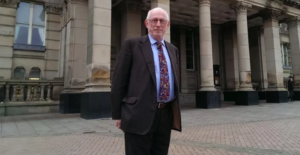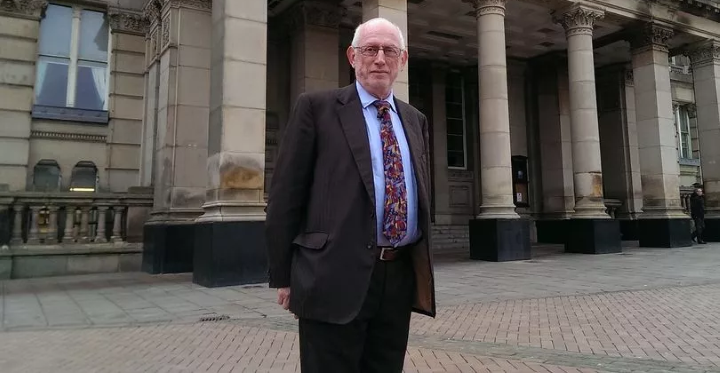With many councils warning of potential s114s due to unforeseen financial shocks, the lead commissioner at Birmingham City Council tells Room151 that these authorities are ‘doing the right thing’, but warns that if they materialise it is an ‘admission of failure’.

The past year has seen some of the most high-profile financial failures in local government history, with Birmingham, the largest authority in the UK, being the most recent council to issue not one, but two, section 114 notices.
However, as the Autumn Statement nears, it is not just the councils under government intervention that are in financial trouble, with several authorities over the past few months reporting that they are on the brink of “effective bankruptcy”.
Sitting down with Room151, Max Caller, the “poster child for best value” and lead commissioner at Birmingham City Council, explains that whilst the situation at many of these authorities is “different” to the circumstances at Birmingham, if these councils go on to issue a section 114 notice, it is a “sign of failure” on behalf of the officers, the members or both.
For many of the authorities who are reporting financial stress at the moment, they have been hit by a “perfect storm” of accelerating homelessness and energy costs as a result of high inflation, Caller says.
“After a long period of belt-tightening, it’s not surprising that many authorities that would otherwise be safe and sound councils are unable to cope. But, the Sloughs, the Thurrocks, the Wokings, the Nottinghams and the Birminghams are not in that group, they are authorities that made bad decisions.
“These are not authorities that have been hit by unforeseen things. They knowingly marched everybody off the cliff and fell on the rocks below,” he argues.
It’s all about governance and culture. If you have an authority that won’t look itself in the face and say ‘this isn’t right’, it’s not going to work – Max Caller, lead commissioner, Birmingham City Council.
S151s must tell the ‘unpalatable truths’
When it comes to Birmingham, the authority refused to accept the truth about its pay claim and acted on the Bob Kerslake review in 2014, which revealed that the authority “must radically improve” if it is to deliver services that the residents of Birmingham deserve. Instead of fixing its issues, Birmingham spent all its time conducting the Commonwealth Games, Caller states.
“It’s all about governance and culture. If you have an authority that won’t look itself in the face and say ‘this isn’t right’, it’s not going to work,” he says.
Caller emphasised that part of the statutory obligation of a section 151 officer at an authority is about being “honest” and telling the “unpalatable truths” to members despite the reaction it may have.
“You must have the confidence, knowledge and integrity to say ‘council this is my job: my job is to tell you the truth about what’s going on; my job is to give you choices; my job is to deliver what you asked me to do if it’s lawful and to do it within the budget you set; but, if you ask me to do something, and there isn’t the money and it’s not lawful, my job is to tell you that explicitly’,” he explains.
This job requires “strength of character and purpose”, Caller adds, but it also requires that risk analysis and hard work be done beforehand, which is what the s151s at authorities who have warned of potential section 114 reports in the future are doing.
“The authorities that are in my ‘bad bunch’ didn’t issue section 114 notices having told members that they were heading towards the cliff and they could change their ways. They did it when they realised that they hadn’t told them and there was no way out. So, the people going along now who are saying there’s a risk of a potential section 114 are doing the right thing,” he continues.

S114 an ‘admission of failure’
However, when asked whether he agrees with the recent sentiment at an inquiry by the Levelling Up, Housing and Communities (LUHC) committee that issuing a section 114 notice has moved from being “idiosyncratic” to being “systemic”, Caller disagreed.
He notes that even though many councils are warning of potentially issuing a section 114 notice, so far none of these warnings have materialised. “If these authorities heed the warnings of their statutory officers and do something about it, however unpalatable that is, you’ll never get to it,” Caller states.
He therefore argues that for this reason, the issuance of a section 114 notice is an “admission of failure”.
“It’s either a failure on behalf of the officers that they didn’t tell members or a failure on behalf of members that they didn’t want to listen, or a joint failure that no one wanted to look at the realities of the world in which they face.
“It’s still career-ending if it is issued like the authorities who have recently issued section 114s,” he argues.
‘Reimagining’ local government
Caller’s advice to the authorities warning of potential section 114s is that they need to “reimagine what the council is all about”, a process that Birmingham is currently undergoing.
“It is inevitable that Birmingham will be 15% smaller in two years time. So, what does this mean? What is Birmingham going to offer to its residents? What is it going to do? What will it not?” Caller asks.
However, he highlights that this is not something new to councils, the “bread and butter” of local government is about evolving its responsibilities when hard financial times arise. “It should always be a part of what we do and lots of councils do that now,” he says.
“Anyone who says that ‘the bandwidth of local government has shrunk as the consequence of austerity’ is right. The things that I used to be able to contemplate in 2000 of what the council could do on its own are no longer possible.”
Caller notes that unfortunately, local government has always been at “the end of the food chain” in regard to funding. “We’re not like Oliver asking for more. We didn’t even get our first helping.” But, he explains that local government can use partners and work with others to overcome these challenges.
The authorities that are in my ‘bad bunch’ didn’t issue section 114 notices having told members that they were heading towards the cliff and they could change their ways. They did it when they realised that they hadn’t told them and there was no way out – Max Caller, lead commissioner, Birmingham City Council.
Lobbying argument needs to shift
In addition, Caller explains that the argument around lobbying for more funding from central government also needs to shift.
“My advice to officers would be that at the end of the day, we need to live within our means. That means that we have to stop moaning about the fact that we don’t have enough money.
“If you go to the government and say ‘you’ve underfunded us for the last 400 years’, they will respond by saying ‘yes, next question’.
“But, actually, the argument needs to focus on saying ‘here are some financial shocks that we couldn’t possibly or reasonably be expected to deal with’,” he explains.
However, Caller reflects that the financial challenges and hardship experienced in local government over the years are what makes working in the sector “intensely rewarding”.
“Doing the right thing for your people in your place is the best job in the world. You don’t get rich doing it and it’s a lot of heartache, but it’s wonderful,” he concludes.
—————
FREE weekly newsletters
Subscribe to Room151 Newsletters
Follow us on LinkedIn
Follow us here
Monthly Online Treasury Briefing
Sign up here with a .gov.uk email address
Room151 Webinars
Visit the Room151 channel















